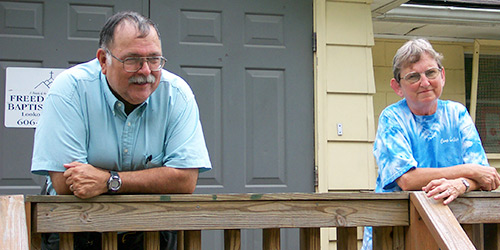When Greg and Alice Whitetree first came to the Freeda Harris Baptist Center in eastern Kentucky nearly 30 years ago, they came reluctantly. Now they say they will likely never leave.
 Greg and Alice Whitetree have found a home in Elkhorn City, Ky., where they have served as directors of the Freeda Harris Baptist Center for nearly 30 years. The Whitetrees recently retired as NAMB missionaries but have remained on as the directors of the center, now as Mission Service Corps volunteers.
Greg and Alice Whitetree have found a home in Elkhorn City, Ky., where they have served as directors of the Freeda Harris Baptist Center for nearly 30 years. The Whitetrees recently retired as NAMB missionaries but have remained on as the directors of the center, now as Mission Service Corps volunteers.After serving the North American Mission Board and the Kentucky Baptist Convention in the small coal-mining community near Elkhorn City, Ky., the Whitetrees agreed to take early retirement last summer. But instead of heading off to relax in their golden years, the couple offered to continue working at the center as volunteers.
“[NAMB was] committed to keeping this Baptist center open, and I asked if Alice and I could stay on as Mission Service Corps volunteers,” said Greg. “Instead of living on a salary, we’re living on our annuities and Social Security. We feel strongly called to this ministry of working with the children, teenagers and adults here.”
However, the Whitetrees were not sure about that commitment when they first visited the rural community in 1983 after 13 years of inner-city work in Kentucky, Hawaii and Iowa.
“We were pretty reluctant about coming up here,” said Greg, “but when we visited, we were kind of impressed.” It was on that visit they also met Freeda Harris, the namesake of the center, who was a Home Mission Board missionary reaching out to children in the Pike County community in the 1960s and 1970s.
The Whitetrees began reaching out to the children with what was then known as “Big A Clubs.” Ministry to the kids continues year-round today, and mission teams provide summer programs including VBS and sports camps.
“We bring in groups. A lot of them come from South Carolina,” said Greg. “That’s our contact with the kids. Through it all, we tell them how much Jesus loves them and explain the gospel message to them.”
Since building a gym in 1997, the ministry has included a basketball outreach that reaches teenagers and men. The current basketball season has about 80 men on 10 teams playing 20 games each.
“We had many of these guys as kids until junior high school, but then we lost them,” Greg said. “They started coming down to play basketball, and now I have guys coming in that I had never been able to reach before. We try to witness to these guys. Many – are on drugs. They are into alcohol and have many problems.”
 Greg Whitetree is often found in the driver’s seat of a bus he uses to pick up children and others to bring them to activities at the Freeda Harris Baptist Center in eastern Kentucky.
Greg Whitetree is often found in the driver’s seat of a bus he uses to pick up children and others to bring them to activities at the Freeda Harris Baptist Center in eastern Kentucky.Martin Hogg, youth and children’s minister at Grassy Pond Baptist Church in Gaffney, traveled to the center in 1998 with his wife, Rebecca, through NAMB’s US/C2 program. Hogg was one of the first to work with the basketball program.
“There was nothing there for the people to do, and we would have basketball nights,” Hogg said. “We would take a break and have a Bible study, which they had to participate in if they wanted to keep playing basketball that night. We had kids making professions of faith.”
Bringing people to Jesus Christ is the main focus of the center’s ministries.
“We don’t see changes like you see at a Billy Graham crusade, where hundreds or even thousands come forward, but we see about 35 to 40 people accept Christ every year,” said Greg. “Some of them come in and they go right back out, but many of them stick around.”
Alice runs a clothes closet and food pantry at the center.
“At the clothes closet, people come and become friends, some of them for 30 years,” she said. “We have a circle of prayer at the beginning and learn who they are, what problems they have. They are free to say, ‘This is going on,’ and, ‘I need prayer for this.’ It’s more like a family.”
Seth Walker, missions leader at Palmetto Baptist Church in North Spartan Association, has been working to provide food and other needed items for the Whitetrees’ ministry for about 10 years.
“I’ve been trying to be a friend to them and meet the needs with the supplies we take,” said Walker. “Every time we go, we discover new needs.”
So what keeps the Whitetrees enthusiastic about a ministry enough to stay – even in retirement?
“It’s just the excitement of getting up each day and wondering where the Lord’s going to lead,” said Greg.
The couple admitted they also have a personal interest in the community: Both of their children married people in the mountain community and are raising their children there.
“I can’t leave,” said Alice. “My grandchildren are here.”